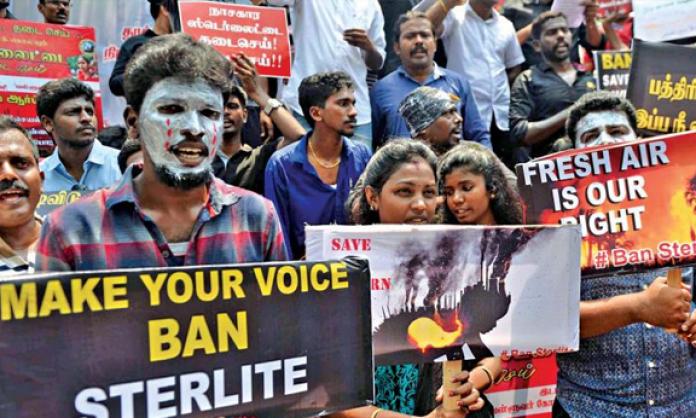On 22 May, 13 people in the city of Thoothukudi in the southern Indian state of Tamil Nadu were massacred by police on the 100th day of continuous protest against the expansion of the giant Sterlite copper smelter. Sterlite is a subsidiary of Vedanta Resources, a multinational with operations in eight countries, including Australia.
It’s a familiar story. A global mining and metals company faces a backlash from locals after persistently flouting environmental standards. The company enjoys a cosy relationship with government officials and police, which employ deadly violence to quash the protests.
It’s a story of state-sanctioned murder to protect corporate profit – the same story played out around the world, from Bougainville to Nigeria to Brazil and everywhere between.
Corporate criminal
Vedanta is majority owned by Indian businessman Anil Agarwal, whose net worth is estimated by Forbes at US$3.3 billion. The company’s reputation is so bad that a 2007 ethics report for the Norwegian government pension fund found that investing in it represented an “unacceptable risk of complicity in present and future severe environmental damage and systematic human rights violations”.
In 2005, while pushing to construct a bauxite mine on the land of an indigenous tribe in the eastern Indian state of Odisha, the company was found to have illegally evicted people from their homes and held them prisoner in specially built camps, and that “an atmosphere of fear was created through hired goons, the police and the administration”.
In 2009, another Indian subsidiary of Vedanta, Bharat Aluminium, was constructing a power plant in the state of Chhattisgarh when a 250-metre-high chimney collapsed, killing 41 workers.
Wherever Vedanta has gone, it’s the same story. Villagers in Zambia sued the company in 2015 over pollution from its copper mine, which resulted in widespread illness and death of fish along the Kafue River. A Zambian judge said, “This was lack of corporate responsibility and criminal, and a tipping point for corporate recklessness”.
The Sterlite copper smelter on the outskirts of Thoothukudi has been opposed by locals since it began operation in 1997. That year, two ships carrying copper ore from Australia, destined for the smelter, were blockaded by fishermen in Thoothukudi’s port.
They had good reason to be concerned. From the beginning, Sterlite has flouted environmental laws. Locals complained of groundwater contamination in 1998. A court-ordered study by the National Environmental Engineering Research Institute confirmed this. Water from around the plant was found to contain dangerous levels of arsenic, selenium, cadmium, magnesium and copper.
Local villagers were forced to rely on expensive bottled water for drinking. But they were exposed to the contaminated water while washing and bathing.
Besides water contamination, there were frequent gas leaks. The combined impact of air and water pollution led to skin diseases, headaches and increased cancer rates among the local population. One slogan of the recent protests has been “Copper for Sterlite, cancer for people”.
Despite the evidence, no serious action has been taken against the company. And since 1998, production has expanded from 40,000 tonnes to 400,000 tonnes a year. The smelter is now the seventh largest in the world, meeting 36 percent of India’s copper demand.
The massacre
For more than 20 years, locals have campaigned to shut the smelter. Again and again, they’ve been rebuffed. The final straw – which led to the most recent outbreak of protest – was an application by Sterlite to expand production to 800,000 tonnes a year.
The protests were organised by a range of local groups and activists. Kumar, an anti-Sterlite activist from Tamil Nadu currently living in Sydney, told Red Flag:
“It is a mass movement self-organised by the people of Thoothukudi themselves. People were peacefully protesting for 99 days with the demand to shut down the plant permanently. On the 100th day, 22 May, tens of thousands of locals gathered outside the district collector’s office. As people were peacefully protesting, police opened fire at them.”
Video shows a policeman shouting an order to “kill at least one of the protesters”, as another climbs onto the roof of a van and opens fire. As Kumar sees it, this was no spur of the moment decision. “It was a targeted killing”, he says. Despite about 20,000 people participating, “It was key organisers of the protest that were killed”.
Following the massacre, the Tamil Nadu government declared a ban on public gatherings and shut down the internet to hinder further protests. According to Kumar, “People have lost trust in the government of both Tamil Nadu and India. The demand from the people is now to organise an international commission of inquiry into the killings”.
Aftermath
As outrage over the massacre grew, the Tamil Nadu government sought to diffuse the situation. The families of those killed were offered compensation payments, and the government announced that the Sterlite smelter was being permanently shut.
Activists, however, are sceptical. “Similar announcements were made in the past, and Vedanta Resources approached the Supreme Court and the plant resumed operating”, Kumar says. “The people demand not only to shut down the plant, but also to decommission it.
“It is unlikely that the government will keep their promise. Both the government of India and Vedanta just want to end the protests. The decline in Vedanta’s share price and the protests against the killings were the prime reasons.”
The scepticism is justified. Following the announcement, sources close to the company told Reuters that Vedanta was working on a legal challenge to the government’s decision, but that it would wait until tensions over the deaths of protesters had eased.
India’s two main political parties, the Indian National Congress and the Bharatiya Janata Party, have both been recipients of significant financial support from Vedanta over many years. The Vedanta group of companies was the largest donor to the two parties in 2004-15.
Whatever politicians may say under the immediate pressure of a mass movement, in the long term they serve their corporate masters.
Despite doubts about the promise to shut the plant permanently, however, activists believe the struggle will contribute to lasting change. “The recent protests definitely would have caused alarm to all those industries polluting the environment, and would have an impact across Tamil Nadu”, Kumar says.
We can hope that the impact goes beyond India. Around the world, there are hundreds, if not thousands, of desperate struggles waged by local communities against corporate environmental vandals like Sterlite.
In Australia’s case, there’s a direct connection. While the protesters in Thoothukudi were resisting the expansion of the smelter, the Tasmanian Liberal government was handing $34 million in subsidies to the Vedanta-owned Copper Mines of Tasmania to re-open the Mount Lyell mine. If Vedanta overturns the shutdown of its Sterlite smelter, the copper ore from Mount Lyell will be destined for it.
Capitalism is a powerful and global system – one in which big business, politicians and police frequently conspire to inflict murderous violence on those who get in their way. Faced with such violence, our side must redouble its efforts to build an equally powerful global movement to overturn their rotten system for good.











